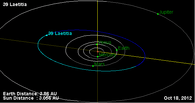39 Laetitia
 | |
| Discovery | |
|---|---|
| Discovered by | J. Chacornac |
| Discovery date | February 8, 1856 |
| Designations | |
| Minor planet category | Main belt |
| Orbital characteristics[1] | |
| Epoch December 31, 2006 (JD 2454100.5) | |
| Aphelion | 461.503 Gm (3.085 AU) |
| Perihelion | 366.877 Gm (2.452 AU) |
| Semi-major axis | 414.190 Gm (2.769 AU) |
| Eccentricity | 0.114 |
| Orbital period | 1,682.713 d (4.61 a) |
| Average orbital speed | 17.84 km/s |
| Mean anomaly | 58.261° |
| Inclination | 10.383° |
| Longitude of ascending node | 157.168° |
| Argument of perihelion | 209.560° |
| Physical characteristics | |
| Dimensions |
219×142km[2] 149.5 km[1] 153.80 ± 4.14[3] km |
| Mass | (4.72 ± 1.14) × 1018[3] kg |
| Mean density | 2.47 ± 0.63[3] g/cm3 |
| Equatorial surface gravity | ~0.0418 m/s² |
| Escape velocity | ~0.0790 km/s |
| Rotation period | 0.2141 d (5.138 h)[1][4] |
| Albedo | 0.287 (geometric) [1][5] |
| Temperature | ~158 K |
| Spectral type | S[1] |
| Apparent magnitude | 8.97[6] to 12.18 |
| Absolute magnitude (H) | 6.1[1] |
| Angular diameter | 0.142" to 0.051" |
|
| |
39 Laetitia /lɨˈtiːʃiə/ is a large main-belt asteroid that was discovered by French astronomer Jean Chacornac on February 8, 1856,[7] and named after Laetitia, a minor Roman goddess of gaiety.
Photometric observations of this asteroid gathered between 1968–74 were used to build a light curve that provided shape and rotation information. It has the general shape of an elongated triaxial ellipsoid with ratios between the lengths of the axes equal to 15:9:5. Major surface features are on a scale of 10 km and the surface color does not vary significantly across the surface. In the ecliptic coordinate system, the pole of rotation is estimated to be oriented to the coordinates (λ0, β0) = (121° ± 10°, +37° ± 10°).[8]
In 1988 a search for satellites or dust orbiting this asteroid was performed using the UH88 telescope at the Mauna Kea Observatories, but the effort came up empty.[9] Photometric observations collected during 2006–08 were used to measure time variations of the asteroid light curve. This data suggests that the asteroid may have a complex shape or it could be a binary asteroid system.[10] Observations of an occultation on March 21, 1998, produced several chords indicating an ellipsoidal cross-section of 219 × 142 km.[2]
References
- ↑ 1.0 1.1 1.2 1.3 1.4 1.5 Yeomans, Donald K. "39 Laetitia". JPL Small-Body Database Browser. NASA Jet Propulsion Laboratory. Retrieved 2013-04-07.
- ↑ 2.0 2.1 "1998 European Asteroidal Occultation Results". euraster.net (a website for Asteroidal Occultation Observers in Europe). 1998-03-21. Retrieved 2008-12-01. (Chords)
- ↑ 3.0 3.1 3.2 Carry, B. (December 2012), "Density of asteroids", Planetary and Space Science 73: 98–118, arXiv:1203.4336, Bibcode:2012P&SS...73...98C, doi:10.1016/j.pss.2012.03.009. See Table 1.
- ↑ "Asteroid Lightcurve Parameters". Planetary Science Institute. Archived from the original on 2006-06-14. Retrieved 2008-11-03.
- ↑ "Asteroid Data Archive". Planetary Science Institute. Archived from the original on 2006-06-23. Retrieved 2008-11-03.
- ↑ "AstDys (39) Laetitia Ephemerides". Department of Mathematics, University of Pisa, Italy. Retrieved 2010-06-26.
- ↑ "Numbered Minor Planets 1–5000", Discovery Circumstances (IAU Minor Planet center), retrieved 2013-04-07.
- ↑ Sather, R. E. (January 1976), "Minor planets and related objects. XIX - Shape and pole orientation of 39 Laetitia", Astronomical Journal 81: 67–73, Bibcode:1976AJ.....81...67S, doi:10.1086/111854.
- ↑ Gradie, J.; Flynn, L. (March 1988), "A Search for Satellites and Dust Belts Around Asteroids: Negative Results", Abstracts of the Lunar and Planetary Science Conference 19: 405–406, Bibcode:1988LPI....19..405G.
- ↑ Vereshchagina, I. A. et al. (August 2009), "Some specific features of light curves of (39) Laetitia, (87) Sylvia, (90) Antiopa, and 2006 VV2 asteroids", Solar System Research 43 (4): 291–300, Bibcode:2009SoSyR..43..291V, doi:10.1134/S0038094609040030.
External links
- Orbital simulation from JPL (Java) / Ephemeris
| |||||
| ||||||||||||||||||||||